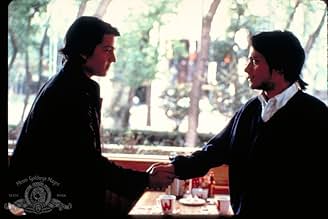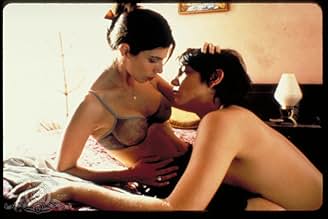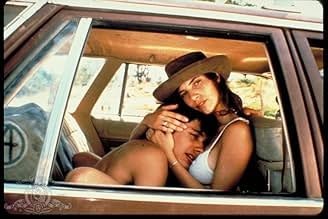No México, dois adolescentes e uma mulher mais velha, se embarcam numa viagem e aprendem sobre a vida, a amizade, o sexo e o outras coisas.No México, dois adolescentes e uma mulher mais velha, se embarcam numa viagem e aprendem sobre a vida, a amizade, o sexo e o outras coisas.No México, dois adolescentes e uma mulher mais velha, se embarcam numa viagem e aprendem sobre a vida, a amizade, o sexo e o outras coisas.
- Direção
- Roteiristas
- Artistas
- Indicado a 1 Oscar
- 39 vitórias e 48 indicações no total
Daniel Giménez Cacho
- Narrator
- (narração)
- Direção
- Roteiristas
- Elenco e equipe completos
- Produção, bilheteria e muito mais no IMDbPro
Avaliações em destaque
Before you read any further I would like to strongly suggest that you go see this film. Do not read my review and just go see it. Find out where it's playing and buy yourself a ticket, in fact bring as many of your friends as you can, such as I did, and I promise you will all somehow have enjoyed it in a way films are rarely enjoyed. I do not feel that I will be able to describe exactly what I felt having seen this film, but if you would like to see my effort then read on.
This is the story of 2 teenagers, Tenoch and Julio, best friends their whole lives, which have indulged in many of life's guilty pleasures. We meet them at a point when their respective present girlfriends are leaving to study in Italy, leaving the 2 friends on their own for the summer. In the short time after their departure we see a whole new side of the boys. They masturbate to the thought of Salma Hayek, smoke weed, drink hard, and flirt with another man's wife. She is a beautiful older woman named Luisa at a wedding, who in turn is Tenoch's cousin's wife. They flirt with her and invite her to come with them to the fictional beach Heaven's Mouth. She is of course reluctant, but takes them up on the offer after her husband one night calls her to confess he cheated on her. This is the beginning of the road trip to the non-existent beach that will change their lives.
An unidentified man narrates the entire film, and when he speaks all goes silent in the scenes serving as a moving freeze frame if you will. He speaks the future of the lives we are watching these people interact with, and ultimately you begin to worry what will be of there own future. During this road trip to the fictional beach, all 3 main characters meet new and interesting people in new and interesting parts of Mexico. It makes them ponder life as their own past experiences begin to unravel in their intimate and personal conversations. Not before long the compounded sexual tension between them is in a way relieved, but to mixed consequences. All of the subtle characteristics of jealousy, anger, passion, naivety, become completely real.
These characters are so believably acted, that when you see these actors in interviews or in other films you'll almost feel cheated. Relationships like this simply don't seem like they can be cheated; yet through some form of skill and humanity every element comes together just right, never distracting or deterring you from the story.
Featured are some of the best-shot sex scenes ever (as one of my friends pointed out as a matter of fact). `Y tu Mama Tambien' finds a way of making all of it's moments feel intimate and genuine, yet never in bad taste. Alfonso Cuaron makes it difficult for us to believe what we are seeing at times is only movie, which serves this tale all the more. The shaky `Road Film Style' cinematography used here is perfect in capturing this uncommon, and unbalanced relationship. You are kept on your toes at all times, expecting something or someone to break. The dialogue is fresh and funny, the kind you just know cannot be faked, that in fact somewhere somehow the writer or actors uttered those phrases. I am convinced that a great majority of this film was improvised, whatever the case may be.
This film is obviously more than flesh, more than experimenting youth. Take some of your favorite moments from mediocre mainstream movies like `American Pie 1 and 2' and remove all the slapstick value. You will realize that there is much more there than you ever saw before. That is what I think in small part this film strives to achieve. It succeeds. We can sympathize with theses characters every step of the way, because as we first get to know them you realize that they either are like you, someone you know, knew, or maybe someone you always wished you could be. By the time things begin to happen to these characters you yourself begin to feel part of their journey.
This is an experience many of you won't take part in, and that is the sincere shame. Instead a great majority of people have been walking out of `The Scorpion King' unchallenged and un-entertained. `Y Tu Mama Tambien' offers a true form of escape, one that no blockbuster will dare. It's the lives few of us will ever live, for better or worse. What transcends from the screen to your hearts and minds is as eye opening as anything you'll ever see, and as effecting, if not more, as your own personal life experience. Bold words? Go see it and you tell me.
Note: Please feel free to contact me and share your thoughts on this film or on my review of it.
This is the story of 2 teenagers, Tenoch and Julio, best friends their whole lives, which have indulged in many of life's guilty pleasures. We meet them at a point when their respective present girlfriends are leaving to study in Italy, leaving the 2 friends on their own for the summer. In the short time after their departure we see a whole new side of the boys. They masturbate to the thought of Salma Hayek, smoke weed, drink hard, and flirt with another man's wife. She is a beautiful older woman named Luisa at a wedding, who in turn is Tenoch's cousin's wife. They flirt with her and invite her to come with them to the fictional beach Heaven's Mouth. She is of course reluctant, but takes them up on the offer after her husband one night calls her to confess he cheated on her. This is the beginning of the road trip to the non-existent beach that will change their lives.
An unidentified man narrates the entire film, and when he speaks all goes silent in the scenes serving as a moving freeze frame if you will. He speaks the future of the lives we are watching these people interact with, and ultimately you begin to worry what will be of there own future. During this road trip to the fictional beach, all 3 main characters meet new and interesting people in new and interesting parts of Mexico. It makes them ponder life as their own past experiences begin to unravel in their intimate and personal conversations. Not before long the compounded sexual tension between them is in a way relieved, but to mixed consequences. All of the subtle characteristics of jealousy, anger, passion, naivety, become completely real.
These characters are so believably acted, that when you see these actors in interviews or in other films you'll almost feel cheated. Relationships like this simply don't seem like they can be cheated; yet through some form of skill and humanity every element comes together just right, never distracting or deterring you from the story.
Featured are some of the best-shot sex scenes ever (as one of my friends pointed out as a matter of fact). `Y tu Mama Tambien' finds a way of making all of it's moments feel intimate and genuine, yet never in bad taste. Alfonso Cuaron makes it difficult for us to believe what we are seeing at times is only movie, which serves this tale all the more. The shaky `Road Film Style' cinematography used here is perfect in capturing this uncommon, and unbalanced relationship. You are kept on your toes at all times, expecting something or someone to break. The dialogue is fresh and funny, the kind you just know cannot be faked, that in fact somewhere somehow the writer or actors uttered those phrases. I am convinced that a great majority of this film was improvised, whatever the case may be.
This film is obviously more than flesh, more than experimenting youth. Take some of your favorite moments from mediocre mainstream movies like `American Pie 1 and 2' and remove all the slapstick value. You will realize that there is much more there than you ever saw before. That is what I think in small part this film strives to achieve. It succeeds. We can sympathize with theses characters every step of the way, because as we first get to know them you realize that they either are like you, someone you know, knew, or maybe someone you always wished you could be. By the time things begin to happen to these characters you yourself begin to feel part of their journey.
This is an experience many of you won't take part in, and that is the sincere shame. Instead a great majority of people have been walking out of `The Scorpion King' unchallenged and un-entertained. `Y Tu Mama Tambien' offers a true form of escape, one that no blockbuster will dare. It's the lives few of us will ever live, for better or worse. What transcends from the screen to your hearts and minds is as eye opening as anything you'll ever see, and as effecting, if not more, as your own personal life experience. Bold words? Go see it and you tell me.
Note: Please feel free to contact me and share your thoughts on this film or on my review of it.
After watching this movie, I looked at what a few critics had to say about it and I was shocked to see some of them refer to this movie as a "teen sex comedy". Wow, I didn't get that impression at all! Yes, the movie is infused with sex, and the two lead characters are horny teens, and there are quite a few comedic moments, but this is far from a teen sex comedy. It's treatment of the subject matter is real, for one thing, and backdrop of the Mexican countryside (and the director's detached observation's through third-person narration) bring some sobriety to the film. Be warned, though: there is a lot of sex, so not exactly a movie you're going to want to watch with the in-laws.
In many ways Alfonso Cuaron's "Y Tu Mama Tambien" reminds me of the desolation theme of Bernardo Bertolucci's "Ultimo tango a Parigi" (1972) and the deceptive perspective of Michelangelo Antonioni's "L'Avventura." (1960).
Raging post-adolescent hormonal drives seem to propel Julio and Tenoch forward, with little else of substance to account for. Likewise, Luisa's motivation seems more despair- than romance-driven. Thus, the trio's trek in search of the idyllic Boca del Cielo is reminiscent of the forlorn lovers' quest for emotional fulfillment in the Bertolucci film.
Comparison with the Antonioni opus stems from Cuaron's script seemingly being about a carefree, liberated trio on a journey for fun, when in fact, it's really about escape from their own worst "enemies"--themselves.
After a particularly talky beginning (complete with abundant narrations) the film settles in on its main theme, and the dialogue becomes more pointed. While the camera work is generally appropriate, Cuaron tends to rely on long- to medium-shots, with nary a close-up.
The result of this is a somewhat distant enactment, in which the viewer is held a bit at arm's length from the action. One seldom gets close enough to become intimately acquainted with these people. In the end, one is touched by important revelations which are crucial to understanding that which has transpired. Yet, the viewer's emotional involvement is perhaps less than what it might have been, given closer perspectives.
This film obviously impressed many people, and I must agree the work by the principles is uniformly solid. This is a "last tango" which has made its mark as a distinctive film work.
Raging post-adolescent hormonal drives seem to propel Julio and Tenoch forward, with little else of substance to account for. Likewise, Luisa's motivation seems more despair- than romance-driven. Thus, the trio's trek in search of the idyllic Boca del Cielo is reminiscent of the forlorn lovers' quest for emotional fulfillment in the Bertolucci film.
Comparison with the Antonioni opus stems from Cuaron's script seemingly being about a carefree, liberated trio on a journey for fun, when in fact, it's really about escape from their own worst "enemies"--themselves.
After a particularly talky beginning (complete with abundant narrations) the film settles in on its main theme, and the dialogue becomes more pointed. While the camera work is generally appropriate, Cuaron tends to rely on long- to medium-shots, with nary a close-up.
The result of this is a somewhat distant enactment, in which the viewer is held a bit at arm's length from the action. One seldom gets close enough to become intimately acquainted with these people. In the end, one is touched by important revelations which are crucial to understanding that which has transpired. Yet, the viewer's emotional involvement is perhaps less than what it might have been, given closer perspectives.
This film obviously impressed many people, and I must agree the work by the principles is uniformly solid. This is a "last tango" which has made its mark as a distinctive film work.
From the recent comments on this film board, it's amazing how people can watch this film all the way through and at the end not have any idea what it was about.
This was quite simply one of the best films I've seen in recent years. Using three central characters -- two immature adolescent males and a young woman in crisis -- set in a road-trip situation, it was hardly a road-trip movie. Nor was it an adolescent movie. Nor was it a woman-in-crisis movie. Nor was it about sex. Instead, what starts out with a sizzling but ditzy prologue becomes something much deeper and much more profound as it goes along. By the end I was breathless and somewhat stunned. The character study is amazing. The societal insights are haunting. The shared humanity it exposes is painful at time but ultimately reaffirming and uplifting. These are three of the most memorable, identifiable and completely human characters I've seen on screen in ages. They taught me more about life and the human species than the last ten movies I've seen put together. I'll not soon forget Julio, Tenoch and Luisa and their eye-opening journey to Boca del Cielo.
This was quite simply one of the best films I've seen in recent years. Using three central characters -- two immature adolescent males and a young woman in crisis -- set in a road-trip situation, it was hardly a road-trip movie. Nor was it an adolescent movie. Nor was it a woman-in-crisis movie. Nor was it about sex. Instead, what starts out with a sizzling but ditzy prologue becomes something much deeper and much more profound as it goes along. By the end I was breathless and somewhat stunned. The character study is amazing. The societal insights are haunting. The shared humanity it exposes is painful at time but ultimately reaffirming and uplifting. These are three of the most memorable, identifiable and completely human characters I've seen on screen in ages. They taught me more about life and the human species than the last ten movies I've seen put together. I'll not soon forget Julio, Tenoch and Luisa and their eye-opening journey to Boca del Cielo.
Alfonso Cuaron is simply one of the best Mexican directors in recent years in Mexican film production. His incredible AIDS-driven comedy, "Solo Con Tu Pareja" was maybe the most funny Mexican picture in a long time, and his always present criticism to the way of life of Mexican people in a city such as Mexico City, is incredible accurate and clever. His other projects in the United States, "Little Princess" and "Great Expectations" were beautifully-manufactured motion pictures, with the help (or support, if you may) of the marvellous photographer Emmanuel Lubenzki ("Sleepy Hollow", and the above-mentioned Cuaron movies). Returning to his home country this time, Cuaron displays such magic and poetic visuals, in contrast with the subtle criticism to the society in Mexico, and the clever and sharp dialogs between the leading stars, using every word young Mexicans use to apply in their conversations.
"Y Tu Mama Tambien" (And Your Mother Too) is, in the surface, a really funny story about 2 friends-almost-brothers, Tenoch Iturbide (an outstanding Diego Luna) and Julio (a really incredible performance for the recent Ariel, the Mexican Academy Award, winner Gael Garcia Bernal, in another excellent portray of a young guy with "issues"), that plan a trip to an imaginary beach, "Boca del Cielo" (Heaven´s Mouth) in order to flirt with a Spanish girl, married with Tenoch's cousin, and portrayed by a credible Maribel Verdu.
But this is only the "surface" of this road movie. In fact, we are dealing with dreams and realities, with social problems and political ones. Tenoch is a young guy living with a millionaire family, son of a wealthy businessman with friends in the highest "stairs" of Mexican politics, with a second name such as Iturbide (one of the most important and powerful leaders of Mexican politic history). And, in contrast, Julio is a middle-low-class guy, living with his mother, brothers and sisters, in a small department, with a last name such as Zapata (a revolutionary leader in Mexican history, with native origins, that took part in the Revolution at the beginning of 20th Century). This is a clever and sharp critic of the different models of living of these 2 friends, and in fact, of all Mexican citizens (I know it, because I'm Mexican, too).
Also, the movie has an excellent narration by Daniel Gimenez Cacho, star of a previous Cuaron film, "Solo Con Tu Pareja", that explains the things we cannot see, but that we can understand and feel. The "subtle critic about Mexican society and traditions" that I have talked about all along this comment, is the one thing that makes this picture go from a funny comedy to an intelligent essay of the lives of young people, social classes, discovery and re-discovery of personality and our own soul, and the final revelation of who we are and what we become when time passes by. In the lives of Julio and Tenoch there is no redemption, but a clear message of their goal in life, their true feelings about friendship, and their sexuality. This road trip is only a pretext to tell a story about discovery and finding our true nature.
Yes, maybe it is a little provocative and bold, but because of these characteristics, "And Your Mother Too" is an incredible motion picture, true to its meaning and compromised with the reality it is trying to show. We care about this people, we care about their problems, and at the end, we care about our own society, and we care about what we have become with time. And the true meaning of the movie's title, "And Your Mother Too", within the narrative of the film, is simply hilarious.
Give this movie a chance, and see it. You won't be disappointed. It has an excellent direction, excellent photography, its is very sexy, it showcases credible performances by all its cast. But above all, it has a real story, real character development, and real power. One great movie from a great Mexican director. Maybe not his best, but really near.
"Y Tu Mama Tambien" (And Your Mother Too) is, in the surface, a really funny story about 2 friends-almost-brothers, Tenoch Iturbide (an outstanding Diego Luna) and Julio (a really incredible performance for the recent Ariel, the Mexican Academy Award, winner Gael Garcia Bernal, in another excellent portray of a young guy with "issues"), that plan a trip to an imaginary beach, "Boca del Cielo" (Heaven´s Mouth) in order to flirt with a Spanish girl, married with Tenoch's cousin, and portrayed by a credible Maribel Verdu.
But this is only the "surface" of this road movie. In fact, we are dealing with dreams and realities, with social problems and political ones. Tenoch is a young guy living with a millionaire family, son of a wealthy businessman with friends in the highest "stairs" of Mexican politics, with a second name such as Iturbide (one of the most important and powerful leaders of Mexican politic history). And, in contrast, Julio is a middle-low-class guy, living with his mother, brothers and sisters, in a small department, with a last name such as Zapata (a revolutionary leader in Mexican history, with native origins, that took part in the Revolution at the beginning of 20th Century). This is a clever and sharp critic of the different models of living of these 2 friends, and in fact, of all Mexican citizens (I know it, because I'm Mexican, too).
Also, the movie has an excellent narration by Daniel Gimenez Cacho, star of a previous Cuaron film, "Solo Con Tu Pareja", that explains the things we cannot see, but that we can understand and feel. The "subtle critic about Mexican society and traditions" that I have talked about all along this comment, is the one thing that makes this picture go from a funny comedy to an intelligent essay of the lives of young people, social classes, discovery and re-discovery of personality and our own soul, and the final revelation of who we are and what we become when time passes by. In the lives of Julio and Tenoch there is no redemption, but a clear message of their goal in life, their true feelings about friendship, and their sexuality. This road trip is only a pretext to tell a story about discovery and finding our true nature.
Yes, maybe it is a little provocative and bold, but because of these characteristics, "And Your Mother Too" is an incredible motion picture, true to its meaning and compromised with the reality it is trying to show. We care about this people, we care about their problems, and at the end, we care about our own society, and we care about what we have become with time. And the true meaning of the movie's title, "And Your Mother Too", within the narrative of the film, is simply hilarious.
Give this movie a chance, and see it. You won't be disappointed. It has an excellent direction, excellent photography, its is very sexy, it showcases credible performances by all its cast. But above all, it has a real story, real character development, and real power. One great movie from a great Mexican director. Maybe not his best, but really near.
Você sabia?
- CuriosidadesAlfonso Cuarón did not want to cast Luna for the role of Tenoch because he was a teen idol and soap opera star. Bernal convinced Cuarón to hire Luna because their strong existing friendship would make the performance of their characters' friendship much easier. Cuarón ultimately hired Luna because he became convinced that their bond would produce a natural and honest performance.
- Erros de gravaçãoThe movie takes place in the summertime - we know this from the boys just having graduated, their girls going off to Europe, the weather, etc. Yet at the wedding near the beginning of the film, the narrator tells us that in a few days the president of Mexico will go to Seattle for the WTO conference - which happened in November.
- Versões alternativasSeveral scenes edited out of the final movie were made available for public viewing on the movie's official Web site. The director claims to have created multiple edits of this film to satisfy censorship rules around the world. According to the director, one of these edits, allegedly intended for Mexican distribution in protest of that country's heavy censorship, runs less than 10 minutes.
- ConexõesEdited into Y tu mamá también: Deleted Scenes (2002)
- Trilhas sonorasGo Shopping
Performed by Bran Van 3000
Contains samples from "Shopping" written by Eek-A-Mouse (as Ripton Hylton) and Jamal-Ski
Published by Plaything Music, Explicit Two & Eek-A-Mouse Music
administered by Plaything Music (ASCAP)
Eek-A-Mouse appears courtesy of Explicit Entertainment, by license from Sunset Boulevard Entertainment
Principais escolhas
Faça login para avaliar e ver a lista de recomendações personalizadas
Detalhes
Bilheteria
- Orçamento
- US$ 2.000.000 (estimativa)
- Faturamento bruto nos EUA e Canadá
- US$ 13.839.658
- Fim de semana de estreia nos EUA e Canadá
- US$ 408.091
- 17 de mar. de 2002
- Faturamento bruto mundial
- US$ 33.616.692
- Tempo de duração
- 1 h 46 min(106 min)
- Cor
- Mixagem de som
- Proporção
- 1.85 : 1
Contribua para esta página
Sugerir uma alteração ou adicionar conteúdo ausente

![Assistir a Tráiler [OV]](https://m.media-amazon.com/images/M/MV5BZDE5YjEwYTktN2NiYy00ZmZiLTk3YmEtOTYyYzljMTdkMGMzXkEyXkFqcGdeQXRodW1ibmFpbC1pbml0aWFsaXplcg@@._V1_QL75_UX500_CR0)





































